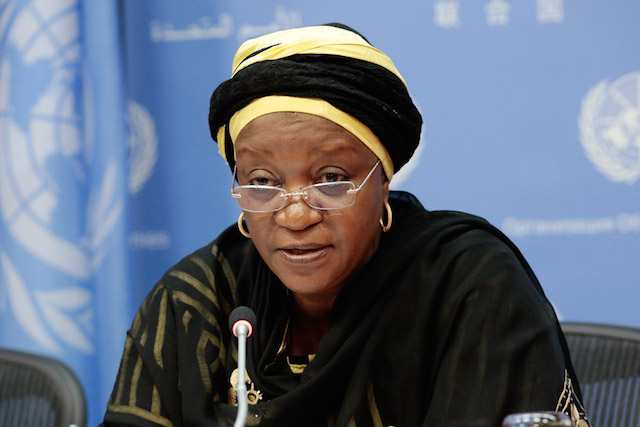By J Nastranis | IDN-InDepthNews Report
NEW YORK (IDN) – Nearly one-and-a-half years ago, the United Nations Human Rights Commissioner Zeid Ra’ad Al Hussein’s predecessor, Navi Pillay, expressed profound regret that Japan had not provided effective redress to Korean victims of wartime sexual slavery leading back to the end of the Second World War.
The agreement reached on December 28 after protracted negotiations between Japan and South Korea – with support by UN human rights experts – seeks to redress the international community has been asking for. According to UN News, the accord reportedly involves an official apology from Japan and a promised payment of $8.3 million for the victims.
Commending the two Governments on their “landmark agreement” to resolve the longstanding issue of ‘comfort women,’ a senior United Nations human rights official has called for its speedy implementation to heal the still raw wounds.
“More than 70 years later, survivors and their families continue to live in shame, and their deep psychological wounds remain unhealed. This is why it is crucial that the authorities have been able to find a way forward beyond their differences, that places the needs of the survivors at the centre,” the UN Secretary-General’s Special Representative on Sexual Violence in Conflict, Zainab Hawa Bangura, said in a press release on December 31, 2015.
“For the former comfort women, acknowledgment that crimes took place with an involvement of the Japanese military authorities at that time, is one critical aspect of healing. The timely implementation of projects for recovering their honour and dignity and provisions of the necessary psychosocial support, is another,” said Bangura, and urged the respective authorities to “implement this agreement as quickly as possible, in its letter and spirit”.
“I believe that the adversity of this experience, but more importantly the common purpose and determination that now exists to move forward, places Japan and the Republic of Korea in a unique position to champion the agenda to eradicate conflict-related sexual violence worldwide. I urge both countries to take up the mantle of leadership,” she added.
Earlier, welcoming the agreement on December 28, which Japan and South Korea said was “final and irreversible”, UN Secretary-General Ban Ki-moon urged the two countries to look to the future in their relationships while still recognizing history.
“The Secretary-General hopes that the agreement will contribute to improving the bilateral relationship between the two countries,” said a statement issued by his spokesperson, referring to the accord reached at a bilateral Foreign Ministers meeting held in Seoul.
“He appreciates President Park Geun-hye of the Republic of Korea and Prime Minister Shinzo Abe of Japan for their leadership and vision for the betterment of the relationship between the two countries as reflected in an earlier agreement at the bilateral summit on 2 November,” the statement said.
Ban also stressed the importance of the two countries to look to the future in their relationships while still recognizing history, stressing the importance of the countries in north-east Asia building “a future-oriented relationship, based on the recognition of history.”
Explaining the background, Bloomberg said the landmark Japan-South Korea deal to end a divisive historical dispute backs U.S. President Barack Obama’s Asia Rebalance policy. It will “lead to increased economic and military cooperation between the U.S. allies, complementing the Obama administration’s efforts to counter China’s rise and North Korea’s nuclear saber-rattling”, Bloomberg stated.
The U.S. has more than 75,000 troops based in the two countries – Japan and South Korea – as part of its effort to maintain military superiority in the region. “In recent months, the U.S. Navy has begun to challenge China over its territorial claims to most of the South China Sea and has looked to its allies for support. Seoul and Tokyo, both in range of Pyongyang’s missile, rely on the U.S. to help deter North Korean aggression.”
The significance of the Japan-South Korea accord is highlighted by the fact that former UN Human Rights chief Pillay had in a statement on August 6, 2014 criticised Japan for failing “to pursue a comprehensive, impartial and lasting resolution” to address the rights of so-called “comfort women.”
She said that the Government of Japan had received over the years recommendations from a number of UN independent experts, human rights treaty bodies and from the Human Rights Council under its Universal Periodic Review for it to take concrete measures to tackle the issue.
The UN Human Rights Committee, which oversees implementation of the International Covenant on Civil and Political Rights, had called on Japan to take “immediate and effective legislative and administrative measures” to ensure that all allegations of sexual slavery are investigated and perpetrators prosecuted.
The Committee also called for access to justice and reparations for victims and their families, the disclosure of all evidence available, and education in the country surrounding the issue.
Praising Japan’s engagement on prevention of violence in conflict, the UN human rights official encouraged the Government “to pursue a comprehensive, impartial and lasting resolution of the wartime sexual slavery issue with the same vigor.”
She underscored that the issue of “comfort women” is not relegated to history, but continues to impede violations of victims’ human rights.
“It is a current issue, as human rights violations against these women continue to occur as long as their rights to justice and reparation are not realized,” Pillay stressed. [IDN-InDepthNews – 1 January 2016]
Photo: Special Representative on Sexual Violence in Conflict Zainab Bangura briefs the press. UN Photo/Evan Schneider
2015 IDN-InDepthNews | Analysis That Matters
IDN is flagship of International Press Syndicate
Send your comment | Subscribe to IDN newsletter
Follow us on Twitter and Facebook:
http://twitter.com/InDepthNews
http://www.facebook.com/IDN.GoingDeeper

